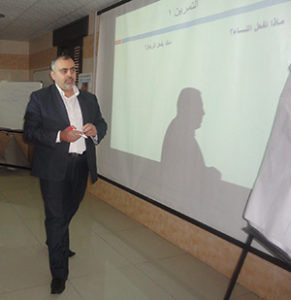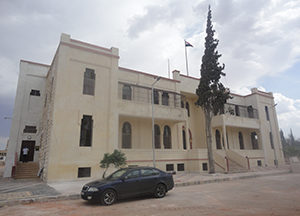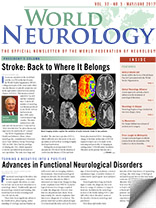By Dr. Mohammad Bassam Hayek

A workshop about epilepsy was presented during a training course funded by the World Health Organization.
Aleppo, Syria, was subjected to a comprehensive war that directly affected all of its humanitarian services. Before July 2012, the difficulties were limited, with most related to security and transport problems.
However, by the end of July, the city had been torn into two large sections. With daily bombardments and clashes, the city’s population plummeted from 4.5 million to 1.5 million. Coinciding with this, the city experienced a complete absence of electricity, a severe decline in health services, and an insufficient number of beds available for hospitalization of stroke patients in government hospitals.
The quality of service provided by the private sector decreased. No MRI device was in service, either in the governmental or private sectors. Seventy percent of the CT machines no longer worked.
A number of neurologists (about 12 out of 30 doctors) left because of the security chaos. There were no neurologists in the area controlled by the armed people. Patients had to travel for several days to see a neurologist.
This was accompanied by the interruption of the supply of most neurological drugs from local markets, especially antiepileptics (valproate, carbamazepine, and phenytoin) and all antiparkinson drugs.

A hospital with 40 beds, built in 1943 and rehabilitated in 2014, has a physiotherapy and rehabilitation department with an EEG machine.
In addition to the unavailability of the necessary anticoagulants for stroke, one of the most important challenges was the loss of records for the treatment of multiple sclerosis (MS). About 900 patients had been periodically reviewed for free medical service and treatment (interferon beta of all kinds). Patients were dispersed, some migrated, and others had new attacks without finding the right medication (methylprednisolone) or the correct diagnosis.
All physiotherapy services disappeared. Although there were a number of therapists, the work was futile.
Due to the many injuries associated with shrapnel and peripheral nerve trauma, neurophysiologists for electromyogram and nerve conduction velocity tests were needed. There also was the occurrence of a number of cases of flaccid paralysis, and it was difficult to find treatment.
Turning the Corner
In January 2013, life was unbearable, and the city seemed to be gloomy without electricity or water, along with the decline of all basic services.
By 2014, a road to the city opened, bringing supplies to the besieged population. Small, private generators within neighborhoods delivered a limited supply of electricity. An MS committee was reorganized, and up to 365 patients were treated for free with beta interferon, but the drugs were from generic companies.
Initially, one MRI was returned to service. In the private sector, three private devices are now operating. However, there are no devices in government hospitals that can be used for free. The average cost of providing an MRI is $60. (The average monthly salary is $100.)
With the passing of time, the service situation stabilized, and the security improved. The U.N.’s international organizations reached the city and helped improve the health system.
Since mid-2014, medicine has become available in an acceptable, but insufficient manner. Currently, most essential neurological drugs are available. The most important are antiepileptic drugs (carbamazepine, sodium valproate, lamotrigine, levetiracetam, and clonazepam), but the supply is unstable. There are still difficulties in securing antiparkinson drugs, especially levodopa.
Continuing medical education and training have declined. The health sector has not prioritized the provision of services.
However, there have been improvements since 2015. The road from Aleppo to Damascus has become safer. Scientific activity has slowly returned, but fear still prevails over some doctors.
Some of the government hospitals are open, including a free neurology clinic at Ibn Khaldoun Hospital. There is free EEG service at three locations, and rehabilitation at one of the public hospitals is open to neurologic patients.
Training of neurologists of all ages is still an important need. This can be accomplished in seminars, scientific conferences, and specialized training programs. Neurological drugs through the World Health Organization are still needed. •
Dr. Mohammad Bassam Hayek is a neurologist in Aleppo, Syria. He is vice president of the Syrian Society of Neurosciences and general director of Ibn Khaldoun Hospital.
